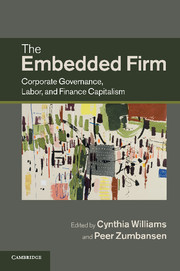Book contents
- Frontmatter
- Contents
- Figures
- Tables
- Contributors
- 1 Introduction: corporate governance after the ‘end of history’
- Part I Historical trajectories of business and regulation
- Part II New interests, new shareholder constellations, new landscapes
- Part III Labor’s evolution in the new economy
- Part IV The transnational embedded firm and the financial crisis
- 17 The intellectual foundations of the global financial crisis
- 18 Why executive pay matters to innovation and inequality
- 19 Products, perimeters and politics
- 20 Modernizing pension fund legal standards for the twenty-first century
- Part V Conclusion
- Index
- References
18 - Why executive pay matters to innovation and inequality
from Part IV - The transnational embedded firm and the financial crisis
Published online by Cambridge University Press: 07 September 2011
- Frontmatter
- Contents
- Figures
- Tables
- Contributors
- 1 Introduction: corporate governance after the ‘end of history’
- Part I Historical trajectories of business and regulation
- Part II New interests, new shareholder constellations, new landscapes
- Part III Labor’s evolution in the new economy
- Part IV The transnational embedded firm and the financial crisis
- 17 The intellectual foundations of the global financial crisis
- 18 Why executive pay matters to innovation and inequality
- 19 Products, perimeters and politics
- 20 Modernizing pension fund legal standards for the twenty-first century
- Part V Conclusion
- Index
- References
Summary
Inequitable and unstable economic growth
The United States is the richest economy in the world. Yet in the 2000s the United States has been unable to deliver equitable and stable economic growth to its own population. The national unemployment rate, which was over 6 percent in the “jobless recovery” of 2003, exceeded 10 percent in the “jobless recovery” of 2009. Even the jobs of well-educated and experienced members of the labor force have been vulnerable to downsizing and offshoring. Given that the financial meltdown of 2008 has not resulted in significant government regulation, there is reason to believe that financial chaos will return in the not-too-distant future.
The distribution of income has become increasingly unequal over the past three decades, with a disappearance of middle-income jobs. As shown in Figure 18.1, in the last half of the 2000s, the share of total income going to the top 1 percent of households rose to well over 20 percent.
- Type
- Chapter
- Information
- The Embedded FirmCorporate Governance, Labor, and Finance Capitalism, pp. 413 - 439Publisher: Cambridge University PressPrint publication year: 2011
References
- 1
- Cited by



